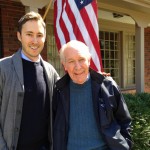There’s been much public discussion in recent years about the role of God and religion in government and civil society. Some want to remove all signs and mentions of God from the public sphere.
In his excellent 2010 book “The Rage Against God: How Atheism Led Me to Faith,” journalist Peter Hitchens recounts not only his spiritual journey as a Christian, but his time spent in Soviet societies that essentially outlawed religion. Those experiences forced him to explore the foundations of European and American societies, foundations built on principles that were a direct outgrowth of the Judeo-Christian belief in God and the idea that all human beings are created in the image and likeness of God.
Below is an excerpt from Hitchens’ book:
Christianity is without doubt difficult and taxing, and all of us fail to emulate the perfection of Christ himself. But we are far better for trying than for not trying…In wars, men are repeatedly asked to undertake acts of selfless courage that they will not themselves survive..For economies to develop, men must be trusted to guard valuables that are not their own. Again and again, for civilization to exist and advance, human creatures are required to do things that they would not “naturally” do as mammals…
Christian societies as a whole are “unnatural,” requiring a host of actions that cannot be based on self-interest, however enlightened, or even on mutual obligation. Meanwhile, the more civilized a society is, the more power is available within it. Power cannot be destroyed, only divided and distributed. It may shatter into an anarchic war of all against all. Or it may solidify into a tyranny. Or it may be resolved into a free society governed by universally acknowledged laws. But on what basis can this be done? What agency can be used to place law above force? A law that does not stand above brute force and have some sort of power that can overcome brute force will not survive for long. How are inconvenient obligations, those of the banker and the messenger and the merchant, to be made binding? How are the young to be made to accept the authority of parents and teachers, once they are physically strong enough to ignore them, but too inexperienced in life to know the value of peace and learning?
The answer, from a very early stage, is that such contracts were made binding by solemn promises sworn in the name of Almighty God and, as Abraham Lincoln used to say of his Presidential Oath, “registered in heaven.” These oaths called into every contract an external power – one whose awful vengeance no man could escape if he defied it, and which he would be utterly ashamed to break. As Sir Thomas More explains in Robert Bolt’s play A Man For All Seasons, when a man swears an oath, “He’s holding his own self in his hands. Like water. And if he opens his fingers then – he needn’t hope to find himself again.
In their utter reverence for oaths, men of More’s era were in my view as superior to us as the builders of Chartres Cathedral were to the builders of shopping malls. Our ancestors undisturbed faith gave them a far closer, healthier relation to the truth – and so to beauty – than we have. Without a belief in God and the soul, where is the oath? Without the oath, where is the obligation or the pressure to fulfill it? Where is the law that even kings must obey? Where is Magna Carta, Habeas Corpus, or the Bill of Rights, all of which arose out of attempts to rule by lawless tyranny? Where is the lifelong fidelity of husband and wife? Where is the safety of the innocent child growing in the womb? Where, in the end, is the safety of any of us from those currently bigger and stronger than we are? And how striking it is that such oaths were used to make us better, not worse, and that the higher power, the magnetic north of moral truth, found an invariable answer in the urgings of conscience.











